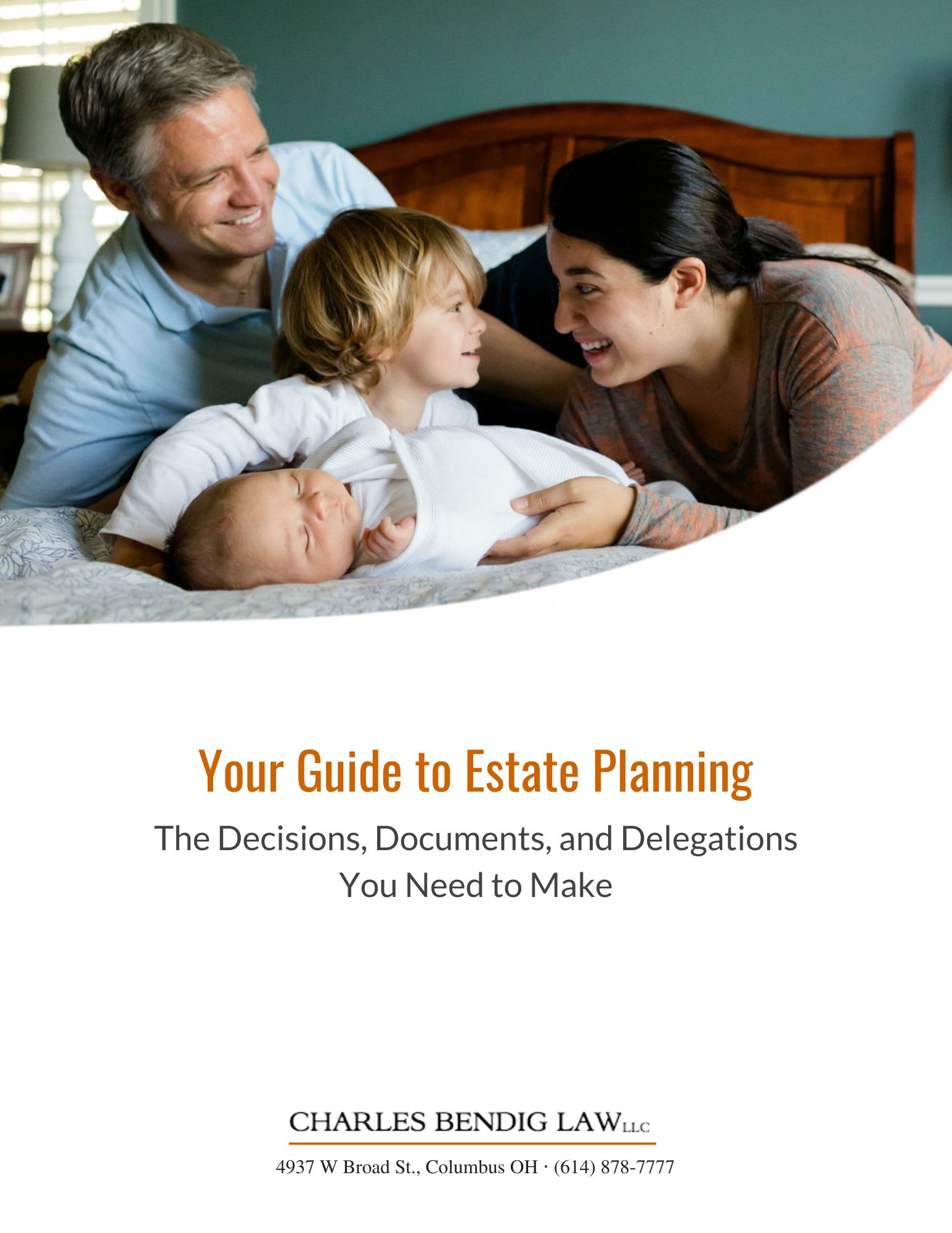Estate Planning Attorney in Columbus
For over 40 years, I’ve served families across Columbus and Dublin as a trusted estate planning attorney. Thoughtful planning ensures your assets, values, and wishes are preserved for the future, giving you peace of mind.


Award-Winning Estate Planning Expertise
Best Estate Planning Attorney in Columbus – 2024
We are honored to be recognized as exceptional.


Why Estate Planning Matters:
Life is full of milestones, memories, and transitions, but it’s also a time to consider your legacy. A well-crafted estate plan ensures your assets, values, and wishes are clearly documented and protected, giving your loved ones security and clarity.
Whether you’re in Short North, Dublin, Hilliard, or Grandview Heights, a proactive plan avoids probate complications and reduces legal disputes.
★★★★★
“I went to Mr Bendig to update my will and put a living will in place. He was patient and kindly expressed the best options to avoid end of life hassles for my heirs.”
– Janice S. (Google Review)
Estate Planning Services
Our tailored solutions will meet your unique needs and provide peace of mind.
Will Drafting
Create a legally enforceable will that ensures your wishes are carried out exactly as intended. Prevent disputes and simplify inheritance.
Trust Formation
Protect assets, minimize taxes, and meet your family’s specific needs with trusts tailored to your circumstances.
Healthcare Directive
Specify medical care preferences and appoint trusted decision-makers in the event you cannot speak for yourself.
Guardianship Appointment
Designate responsible guardians for your minor children and ensure their future is secure.
Probate Assitance
Navigate Ohio’s probate system efficiently and compassionately. Avoid unnecessary stress for your loved ones during difficult times.
Estate Planning Tools
FREE Estate Planning Guide
Packed with tips and includes a printable checklist.

Quiz: What estate planning documents do you need?

Hi, I’m Chuck Bendig.
“As an estate attorney in Columbus for the last 40 years, I know that thoughtful estate planning will carry out your wishes, avoid probate, minimize tax consequences and legal fees, and keep your family together. Your strategy can be simple or complex, depending on how many moving parts that there are in your estate. I will be right there with you to get it done.”
Why Choose Me as Your Estate Attorney
Discussing matters related to inheritance, health care directives, powers of attorney, and guardianship can be emotionally charged. We create a safe space to express your concerns, aspirations, and final wishes.
Local Expertise
Having served the Columbus community for decades, I understand the local laws, courts, and neighborhoods, allowing me to provide estate planning solutions customized to your area.
Legal Expertise
Ohio estate laws can be complex. I ensure your documents, wills, trusts, powers of attorney, and healthcare directives are legally sound and enforceable.
Avoiding Common Mistakes
I help families avoid oversights that can lead to disputes or probate issues, ensuring your plan works as intended.
Updates and Revisions
Life changes, marriages, births, deaths, or financial shifts, require estate updates. I ensure your plan stays current to protect your family and assets.
Book a Consultation
Estate planning in Columbus, Ohio, requires an understanding of state probate laws and the local community’s unique needs. We proudly serve families in neighborhoods like Lincoln Village, Grove City, Galloway, Hilliard, Upper Arlington, and Grandview Heights.
Estate Planning in Columbus, Ohio: What You Need to Know
Understanding Ohio Estate Laws
- Probate Requirements of Ohio: Most estates must go through probate unless specific exemptions apply, such as assets held in a trust or jointly owned property. I will simplify this process and minimize stress for your loved ones.
- No State Inheritance Tax: Ohio does not impose an inheritance tax, but federal estate tax laws may still apply to larger estates.
- Homestead Exemption: Ohio provides certain protections for the primary residence of a deceased individual, which can be an important consideration in estate planning.
Why Estate Planning Is Crucial for Columbus Families
Columbus is a vibrant and diverse community, home to individuals and families with varied estate planning needs. Whether you’re a young professional in the Short North, raising a family in Dublin, or enjoying retirement in Hilliard, having a solid estate plan is vital to protecting your assets and ensuring your wishes are respected.
Some specific concerns Columbus residents often face include:
- Protecting family businesses in Central Ohio from unnecessary taxes or disputes.
- Ensuring that real estate investments in growing neighborhoods like German Village or Grandview Heights are passed down efficiently.
- Providing for children or dependents through well-structured trusts.
Serving the Greater Columbus Community
Our clients come from all over the area, including:
- Downtown Columbus: For young professionals and growing families in the urban core.
- Upper Arlington: Assisting retirees with wealth management and legacy planning.
- New Albany and Dublin: Helping high-net-worth individuals navigate complex estate strategies.
- Grove City and Reynoldsburg: Offering personalized guidance for multi-generational families.
Estate Planning FAQs
What is estate planning, and why is it important?
Estate planning involves preparing legal documents to manage your assets and responsibilities during your life and after your death. It ensures that your wishes are followed, reduces family disputes, and can minimize taxes.
Which estate planning documents are essential?
If your current financial situation doesn’t warrant the need for a revocable living trust, then your basic estate plan will typically include the following legal documents:
- Last Will and Testament
- Advance Medical Directive
- Living Will
- Financial Power of Attorney
Probate and estate planning can be tough. I’m here to walk you through it. Give me a call.
How do I choose the right executor or trustee for my estate?
Choose someone trustworthy, organized, and capable of handling financial and legal matters. This person can be a family member, friend, or a professional trustee, depending on your needs and the complexity of your estate.
What are the differences between a will and a trust?
A will directs how your assets will be distributed after death and typically requires probate. A trust, on the other hand, can help avoid probate and offers more control over how and when assets are distributed.
How does estate planning address taxes?
Estate planning can minimize estate, inheritance, and gift taxes through strategies like gifting, creating trusts, and charitable donations.
What happens if someone dies without a will?
When someone dies without a valid will, Ohio laws will decide how their property will be distributed as well as who will receive the property. Typically family members and heirs that are closely related to the deceased are favored.
How can I protect my estate from creditors or legal disputes?
Using trusts, prenuptial agreements, and proper documentation can help protect your estate from creditors and disputes. Consulting an attorney is crucial for effective protection strategies.
How do I update my estate plan as life circumstances change?
Review your estate plan regularly and update it after major life events such as marriage, divorce, the birth of a child, or significant financial changes.
How do I ensure my health care wishes are followed?
Include advance directives like a living will and health care proxy in your estate plan. These documents outline your medical preferences and appoint someone to make decisions if you are unable to.
What are common mistakes in estate planning, and how can I avoid them?
What is the process of settling an estate in Ohio?
A will and death certificate need to be filed in the Probate Court in the county where the decedent lived. If there is no will, the death certificate is filed with a bond and application to administer by a family member.
Standard forms for probate need to be filed. This begins the process of appointing an executor administrator.
The Court will then issue “Letters of Authority” to the executor administrator which gives the executor administrator legal authority to act on behalf of the estate.
Within 3 months of appointment of an executor administrator , an inventory of the estate’s assets must be filed.
Creditors have 6 months from the date of death to make a claim.
Once all of the creditors and taxes (if any) have been paid, a final account (typically) needs to be filed with the court.
Lastly, the Court will issue an order, distributing the estate’s property to the beneficiaries.
Legal fees are typically paid at the end of the administration.
Some smaller estates qualify for relief from administration, you would need to call an attorney to determine if your estate qualifies or go to probate court and talk to a clerk.
Do all wills need to go through probate?
Many people die without going through probate. Many times, all assets pass automatically at death. The will in that situation is a backup document in the event an asset unexpectedly does not pass automatically at death.
Does an estate executor or administrator receive compensation?
Executor administrators can be compensated for the responsibility, time, and effort they put in to complete the estate process. Executor fees in Ohio are typically set by statute:
4% of the first $100,000 of personal property, income, and proceeds of real estate sold;
3% of the next $300,000;
2% of the balance;
1% of the value of real estate not sold; and 1% of all property that is not subject to probate administration and that is includable for purposes of computing the Ohio estate tax, except joint and survivorship property.
The fiduciary may waive the fee. Additional fees can be awarded for extraordinary services.
Does Ohio have an inheritance or estate tax?
Estate and inheritance taxes are taxes that are levied on people who either own property in the state where they died or inherit property from a resident of a state. Currently Ohio residents are not subject to this tax.



